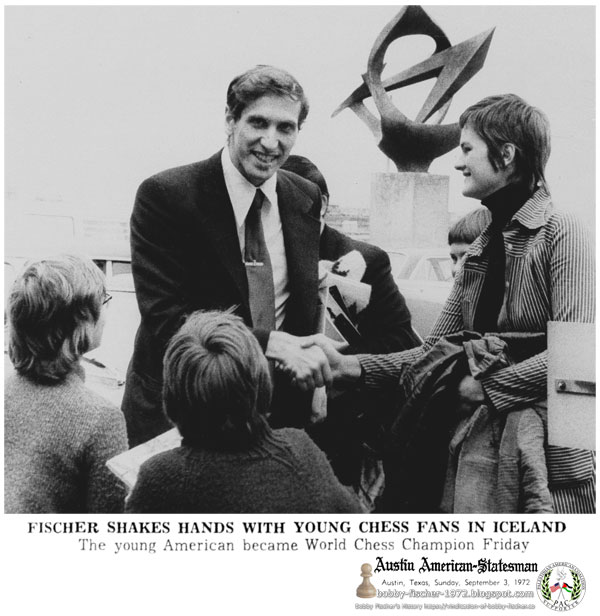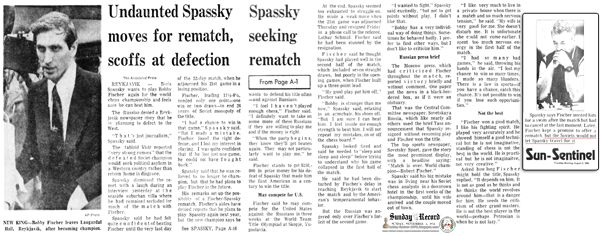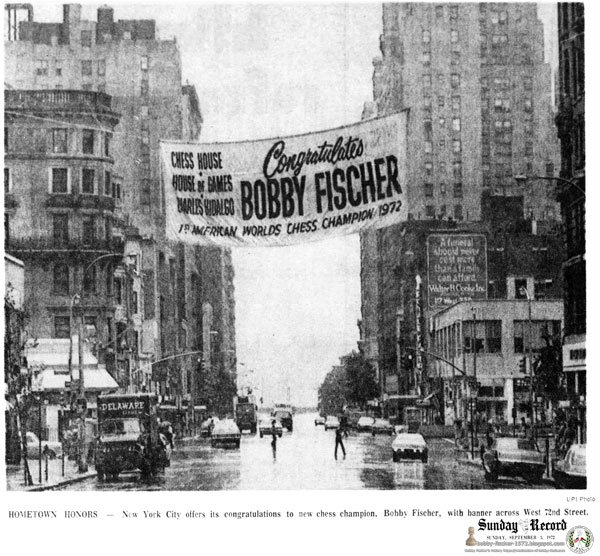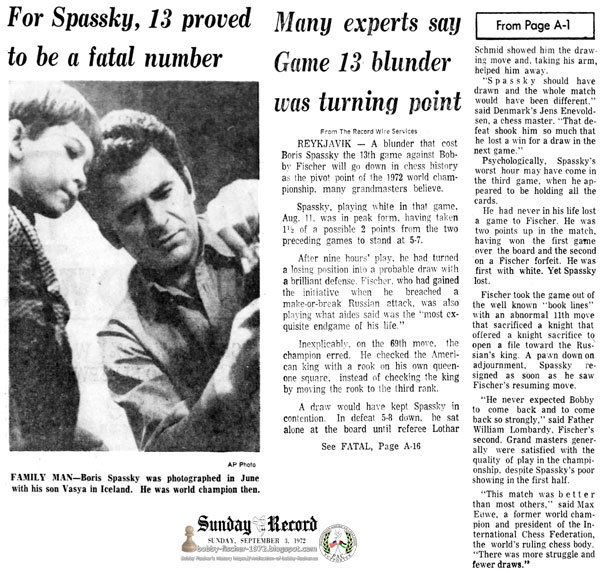Austin American-Statesman Austin, Texas Sunday, September 03, 1972 - Page 8
Fischer Shakes Hands With Young Chess Fans in Iceland.
The young American became World Chess Champion Friday.
The Record Hackensack, New Jersey Sunday, September 03, 1972 - Page 1
Undaunted Spassky Moves For Rematch, Scoffs at Defection
The Associated Press, Reykjavik — Boris Spassky wants to play Bobby Fischer again for the world chess championship and feels sure he can beat him.
The Russian denied a Reykjavik newspaper story that he is planning to defect to the West.
“That's just journalism,” Spassky said.
The tabloid Visir reported “very strong rumors” that the defeated Soviet champion would seek political asylum in a Western country rather than return home in disgrace.
Spassky dismissed the report with a laugh during an interview yesterday at the seaside suburban villa where he had remained secluded for much of the match with Fischer.
Spassky said he had felt quite confident of beating Fischer until the very last day of the 53-day match, when he adjourned his 21st game, in a losing position.
Fischer, leading 11½-8½, needed only one point—one win or two draws—to end 26 years of Soviet monopoly of the title.
“I had a chance to win in that game,” Spassky said. “But I made a mistake. Fischer found the right defense, and I lost my interest in playing. I was quite confident that if he lost just one game, he could not have fought back.”
Spassky said that he was relieved to no longer be champion, but that he had plans to play Fischer in the future.
His remarks set up the possibility of a Fischer-Spassky rematch. Fischer's aides have denied reports that he plans to play Spassky again next year, but the new champion says he wants to defend his title often — and against Russians.
“I feel I haven't played enough chess,” Fischer said. “I definitely want to take on some more of these Russians if they are willing to play me and if the money is right.
“When the party begins, they know they'll get beaten again. They may not particularly want to play me,” he said.
Fischer stands to get $156,000 in prize money for his defeat of Spassky that made him the first American in a century to win the title.
May Compete for U.S.
Fischer said he may compete for the United States against the Russians in three weeks at the World Team Title Olympiad at Skopje, Yugoslavia.
At the end, Spassky seemed to exhausted to struggle on. He made a weak move when the 21st game was adjourned Thursday and resigned Friday in a phone call to the referee, Lothar Schmid. Fischer said he had been stunned by the resignation.
Fischer said he thought Spassky had played well in the second half of the match, which included seven straight draws, but poorly in the opening games, when Fischer built up a three-point lead.
“My good play put him off,” Fischer said.
“Bobby is stronger than me now,” Spassky said, relaxing in an armchair, his shoes off. “But I am sure I can beat him. I feel inside me enough strength to beat him. I will not repeat my mistakes, on or off the chess board.”
Spassky looked tired and said he needed to “sleep and sleep and sleep” before trying to understand why his game collapsed in the first half of the match.
He said he had been disturbed by Fischer's delay in reaching Reykjavik to start the match and by the American's temperamental behavior.
But the Russian was angered only over Fischer's forfeit of the second game.
“I wanted to fight,” Spassky said excitedly, “but not to get points without play. I didn't like that.
“Bobby has a very individual way of doing things. Sometimes he behaved badly. I prefer to find other ways, but I don't like to criticize him.
Russian Press Brief
The Moscow press, which had criticized Fischer throughout the match, reported victory briefly and without comment. One paper put the news in a black-bordered box, as if it were an obituary.
That was the Central Committee newspaper, Sovetskaya Rossia, which like nearly all others used the brief Tass announcement that Spassky resigned without resuming play and Fischer won the title.
The top sports newspaper, Sovetsky Sport, gave the story, with a headline saying: “Match is over. World champion—Robert Fischer.”
Spassky said his big mistake was in living near his Soviet chess analysts in a downtown hotel in the first weeks of the championship, until his wife arrived and the couple moved out of town.
“I like very much to live in a private house when there is a match and so much nervous tension,” he said. “My wife is very good to me. She doesn't disturb me. It is unfortunate she could not come earlier. I spent too much nervous energy in the first half of the match.
“I had so many bad games,” he said, throwing his hands in the air. “I lost my chance to win so many times. I made so many blunders. There is a law in sports—if you have a chance, catch this chance. It's not possible to win if you lose such opportunities.”
Not the Best
“Fischer won a good match, I like his fighting spirit. He played very accurately and he showed himself a good technical but he is not imaginative, standing of chess is not the best in the world. He is practical but he is not imaginative, not very creative.”
Asked how long Fischer might hold the title, Spassky replied, “It depends on him. It is not as good as he thinks and he thinks the world revolves around him—that is a danger for him. He needs the criticism of other grand masters. He is not the best player in the world—perhaps Petrosian is when he is not lazy.”
Photo Caption: New King—Bobby Fischer leaves Laugardal Hall, Reykjavik, after becoming champion.
The Record Hackensack, New Jersey Sunday, September 03, 1972 - Page 1
Hometown Honors
New York City offers its congratulations to new chess champion, Bobby Fischer, with banner across West 72nd Street.
The Record Hackensack, New Jersey Sunday, September 03, 1972 - Page 1
Many Experts Say Game 13 Blunder Was Turning Point. For Spassky, 13 Proved to be a Fatal Number
From the Record Wire Services, Reykjavik — A blunder that cost Boris Spassky the 13th game against Bobby Fischer will go down in chess history as the pivot point of the 1972 world championship, many grandmasters believe.
Spassky, playing white in that game, Aug. 11, was in peak form, having taken 1½ of a possible 2 ponts from the two preceding games to stand at 5-7.
After nine hours' play, he had turned a losing position into a probable draw with a brilliant defense. Fischer, who had gained the initiative when he breahed a make-or-break Russian attack, was also playing what aides said was the “most exquisite endgame of his life.”
Inexplicably, on the 69th move, the champion erred. He checked the American king with a rook on his own queen-one square, instead of checking the king by moving the rook to the third rank.
A draw would have kept Spassky in contention. In defeat 5-8 down, he sat alone at the board until referee Lothar Schmid showed him the drawing move and, taking his arm, helped him away.
“Spassky should have drawn and the whole match would have been different,” said Denmark's Jens Enevoldsen, a chess master. “That defeat shook him so much that he lost a win for a draw in the next game.”
Psychologically, Spassky's worst hour may have come in the third game, when he appeared to be holding all the cards.
He had never in his life lost a game to Fischer. he was two points up in the match, having won the first game over the board and the second on a Fischer forfeit. He was first with white. Yet Spassky lost.
Fischer took the game out of the well known “book lines” with an abnormal 11th move that sacrificed a kngiht that offered a knight sacrifice to open a file toward the Russian's king. A pawn down on adjournment, Spassky resigned as soon as he saw Fischer's resuming move.
“He never expected Bobby to come back and to come back so strongly,” said Father William Lombardy, Fischer's second. Grand masters generally were satisfied with the quality of play in the championship, despite Spassky's poor showing in the first half.
“This match was better than most others,” said Max Euwe, a former world champion and president of the Internationa Chess Federation, the world's ruling chess body. “There was more struggle and fewer draws.”
(Caption:Family Man—Boris Spassky was photographed in June with his son Vasya in Iceland. He was world champion then.) ★



























